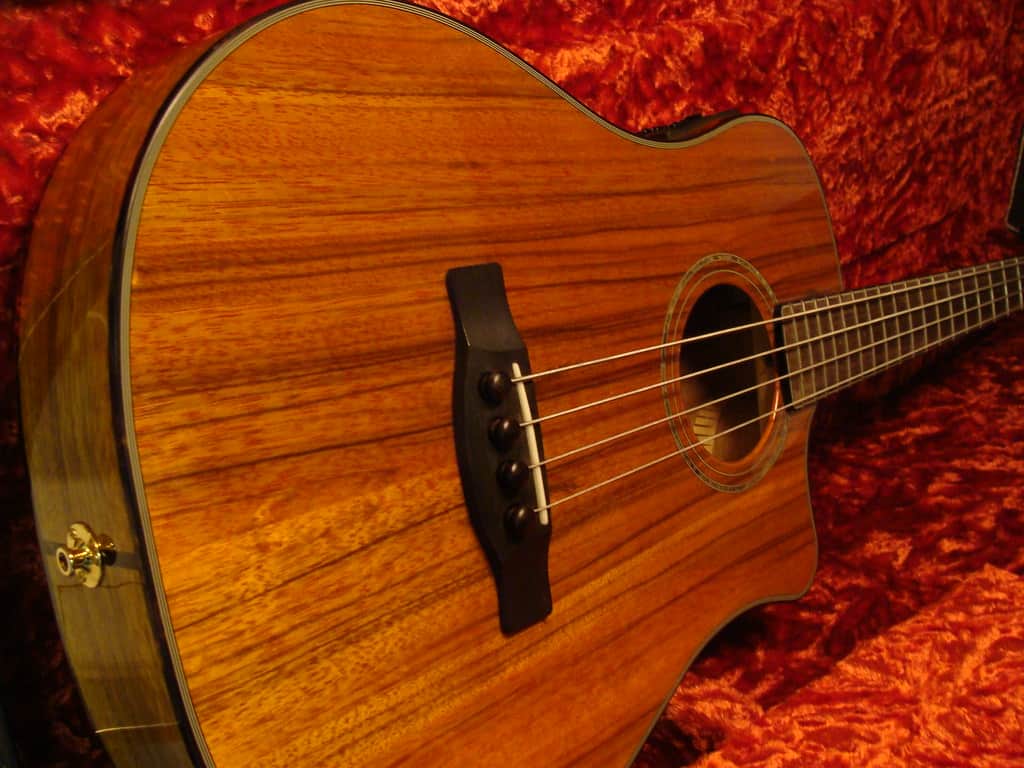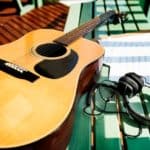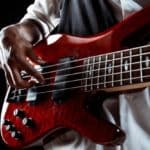Everybody loves acoustic songs.
It doesn’t matter if you are the purest heavy metal lover in the world.
Listening to an acoustic guitar will fill you with goosebumps.
In the end, hard rock and metal groups that use acoustic guitars on some of their songs are not few.
Of course, acoustic bass guitars are part of this experience too.
However, it is fair questioning their power.
All in all, electric bass guitars are not as loud as electric guitars, on the most part.
So, the question is, do acoustic bass guitars sound loud enough?
Acoustic bass guitars are not loud enough to be heard above drums or other loud instruments. This is because human ears cannot detect low frequencies as easily as others. However, acoustic bass guitars can be amplified with a microphone or with magnetic pickups through an amp.
Don’t let this fact let you down. There are lots of ways you can make an acoustic bass sound strong and dominant.
But even if you can’t, you still want to know more details about this rather obscure instrument.
Keep reading to find them out!
Acoustic bass guitar vs double bass
Both acoustic and double bass differ for various reasons.
On the one hand, acoustic bass guitars have a hollow wooden body.
They are similar to acoustic guitars in shape, although as with any bass guitar, they have four strings and a different tuning pitch.
On the other hand, double basses have a wooden, carved bridge to carry the strings and two f-holes. This makes them have similarities with the violin family instruments.
Also, double basses are larger and bigger and can be played with a bow.
Such a huge size makes them a better choice since they provide more volume.
However, both instruments have similarities, too.
They are generally tuned in the same order (from the fourth string to the first: E, A, D, G), and they are an octave below the pitch of a guitar.
How loud are acoustic bass guitars?
Acoustic bass guitars are not exactly loud.
Not even one with a huge body could be heard nearly as good as an acoustic guitar.
It requires a microphone or any device that could amplify their sound.
Why does it work like that?
It is, in part, because they are tuned an octave lower.
The human ear is not meant to perceive or comprehend low frequencies easily.
In any case, they are perceived very faintly, as if the volume was low.
That’s the main reason why people believe acoustic basses aren’t loud instruments.
It’s not that they are low, it’s that we perceive their sound as low.
Are acoustic bass guitars just for playing unplugged or acoustic sets?
There is no doubt acoustic basses are a remarkable selection for any unplugged session.
Now, whether you can play an acoustic bass for an electric set, that’s another story.
It could work, but you’ll need to find the proper setting.
After all, the sound of an acoustic bass guitar is perceived lower than the one of an electric bass.
While a double bass could be a more suitable choice, a regular acoustic bass could still work.
Can you play acoustic bass guitar with a drummer?
Many popular MTV Unplugged sessions have been made.
In those sets, you can clearly see and listen that all bands played with both acoustic bass guitars and drums.
Therefore, the two go together.
However, there are lots of points to consider.
First of all, in those shows, the scenario has previously been set in a way that all the instruments coexist harmoniously.
In other words, sound engineers arranged the instruments accordingly so the drums don’t wrap up the bass sound.
Second, the acoustic bass guitar is being boosted by microphones and amplifiers. It is impossible not to listen to it.
Therefore, you can play acoustic bass along with drums, but it is not a simple task.
Are there electro-acoustic bass guitars?
Electro-acoustic bass guitars are real.
They work like electro-acoustic guitars altogether.
They have their own system of pickups and preamps, which take the signal from the strings’ vibrations and send them to the amplifier.
These kinds of bass guitars are a great selection for musicians who want to stand out while playing.
Ultimately, they could go hand in hand with the drums or be used for non-acoustic sessions.
The only setback with this instrument is its rarity.
Electro-acoustic bass guitars are not that common.
How can you amplify an acoustic bass guitar?
The best solution to the “low-sound issues” of the acoustic bass guitars is to use a microphone.
It’s a quick fix. All you have to do is place the microphone in front of the soundhole.
Now, if you prefer pushing everything to the limit, there is a more complicated alternative as well.
If you use nickel or steel strings, it is possible to add magnetic pickups to the instrument.
What’s great about this is that there’s no need to use a preamp.
Be aware of the fact that magnetic pickups could make acoustic bass guitars sound like regular electric basses.
Is an acoustic bass guitar right for you?
What do you want an acoustic bass for?
I mean, not that you shouldn’t, but what’s the use you’ll give to the instrument?
Possibilities are endless. They go from playing alone in your bedroom, to making acoustic sessions with other musicians.
Do what you want with it, but consider the following.
If you are going to amplify the instrument every now and then, it means that a regular electric bass should be more suitable.
In fact, electric bass guitars fit like a glove in acoustic sets. They sound brittle and strong, without blocking out the rest of the instruments.
Now, you still may prefer an acoustic bass anyway.
That’s okay. Acoustic bass guitars have a particular sound that electric basses cannot replicate.
They are different instruments for a reason, aren’t they?
As usual, the final decision is yours.
If you have doubts, then reflect upon the choice thoroughly.
Maybe you end up getting a normal electric bass.
Maybe not. Maybe you go for that acoustic four-string beauty that you are dying to play with.
Either one or the other, always enjoy it with all your might.

Hello there, my name is Ramiro and I’ve been playing guitar for almost 20 years. I’m obsessed with everything gear-related and I thought it might be worth sharing it. From guitars, pedals, amps, and synths to studio gear and production tips, I hope you find what I post here useful, and I’ll try my best to keep it entertaining also.





